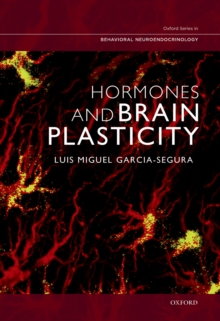
Hormones and Brain Plasticity PDF
by Luis Miguel Garcia-Segura
Part of the Oxford Series in Behavioral Neuroendocrinology series
Description
The nervous system has a remarkable capacity for self-reorganization, and in this first systematic analysis of the interaction between hormones and brain plasticity, Luis Miguel Garcia-Segura proposes that hormones modulate metaplasticity in the brain.
He covers a wide variety of hormones, brain regions, and neuroplastic events, and also provides a new theoretical background with which to interpret the interaction of hormones and brain remodeling throughout the entire life of the organism. Garcia-Segura argues that hormones are indispensable for adequately adapting the endogenous neuroplastic activity of the brain to the incessant modifications in external and internal environments.
Their regulation of neuroplastic events in a given moment predetermines new neuroplastic responses that will occur in the future, adapting brain reorganization to changing physiological and behavioral demands throughout the life of the organism.
The cross-regulation of brain plasticity and hormones integrates information originated in multiple endocrine glands and body organs with information coming from the external world in conjunction with the previous history of the organism.
Multiple hormonal signals act in concert to regulate the generation of morphological and functional changes in neural cells, as well as the replacement of neurons, glial, and endothelial cells in neural networks.
Brain remodeling, in turn, is involved in controlling the activity of the endocrine glands and regulating hormonal secretions.
This bidirectional adjustment of brain plasticity in response to hormonal inputs, and adjustment of hormonal concentrations in response to neuroplastic events are crucial for maintaining the stability of the inner milieu and for the generation of adequate behavioral responses in anticipation of--and in adaptation to--new social and environmental circumstances and life events, including pathological conditions.
Information
-
Download - Immediately Available
- Format:PDF
- Publisher:Oxford University Press
- Publication Date:05/05/2009
- Category:
- ISBN:9780199716821
Other Formats
- EPUB from £63.34
Information
-
Download - Immediately Available
- Format:PDF
- Publisher:Oxford University Press
- Publication Date:05/05/2009
- Category:
- ISBN:9780199716821










